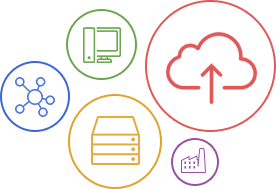Ah, the Internet. One of the most influential parts of our lives. There is so much good the Internet has done for us- connected us to friends, made information fast and free, gave us a way to watch Netflix - the list goes on and on. However, alongside the benefits of the Internet are some disadvantages- somewhat big disadvantages when it comes to cyber security. Since we’re all so available on the Internet, we are unfortunately vulnerable to all the hacking, viruses, and even data breaches that occur.
When I say we’re connected in every way possible, I truly mean we are connected in every way possible. We don’t only use computers for work, and we don’t only use our phone for calls. Mostly every valuable piece of information we have is on our phone or computer, and that has its drawbacks. Sure, we can easily online shop when our credit card information is connected to our web browser, but we can also have our money stolen. Think about all the information you’ve input on to your computer. This is all information that someone with malicious intent can steal. Phone hacking is not an uncommon phenomenon these days.
Even in the last ten years, there have been a tremendous amount of celebrity phone hacks. This has become a problem because of its frequency, having started in the mid-2000’s while affecting at least two dozen stars. Back in 2014, one of the biggest phone hacks swept the world, and 500 photos of celebrities were released. A few of the biggest names affected were Jennifer Lawrence, Miley Cyrus, Kate Upton, and Kristen Dunst. Apple later discovered that through their iCloud, hackers were able to access private information through guessing username and password combinations. After the incident, Apple built upon its data-protection and worked on its “two-step verification”.
While practices have gotten more complex to fight against hacking and data breaches, there are still ways around security questions and extra verification. Security tools are constantly updating, but so are hacking methods. And if hackers can get into a platform as big as Apple's, it means none of us are safe. However, if you try to utilize as many measures as possible to keep protected, you will be in better shape than the rest.
So, what is hacking?
Hacking is when someone targets a computer or phone system to exploit its weakness and gain access to its information. This can compromise digital devices and can even take down an entire network. This means any business is at risk, and that their entire infrastructure can be compromised. While there are some hackers that do good, such as improving security on the page they’re hacking, there are others who don’t have positive intentions. Some people hack to show they can, and others may hack to gain information or to install malware. There are multiple types of hackers that focus on different jobs. And not all of them are malicious- for example, ethical hackers improve security by finding loopholes in the pages they hack.
What are the different types of hacking?
To make it simple, there are three main types- the good guys, the bad guys, and the guys in the middle. According to GeeksforGeeks, there are ten types of hackers altogether. These hackers include people with a range of experience and a range of intent. Below are the different types of hackers and what they do.
White Hat: White hat hackers are government workers that test and identify any issues within their cyber security. They fight against malicious hackers, and they work under rules provided by the government. They are also called ethical hackers.
Black Hat: Black hat hackers are the criminals of the web. They are the hackers that can break into your system, take down your network, and breach your data.
Gray Hat: Gray hat hackers are somewhere in between black and white since they are not authorized by the government to do work. They can use their knowledge for good or bad.
Green Hat: Green hat hackers are not very skilled; however, they do want to learn more about hacking and will build upon their knowledge.
Blue Hat: Blue hat hackers can check any issues with software before it’s launched by a company.
Red Hat: Red hat hackers also try to prevent malicious hackers, but instead of working under rules, they will attack a cyber attacker under their systems are compromised. These are not the people to mess with, as they are extremely skilled.
State-Sponsored: State-sponsored hackers are employed by the government to gain information from other countries.
Script Kiddies: Script kiddies are unskilled and don’t care to learn how to do their own hacking. They will copy and utilize other codes to do their work and have no real purposes besides curiosity and entertainment.
Malicious Insider: This term refers to someone who works for a company that may have inside information they could use maliciously.
How to hack?
While most people think hackers need to be computer whizzes who practice hacking techniques day and night, this is not always the case. However, it is necessary to know about coding and computer programming to be able to understand the nature of the activity. To hack, you need to expand your knowledge of coding, gain a deep understanding of system operation, and have expertise on the fundamentals of networks and security. Hackers have to practice their skills to gain a high-level of knowledge. While ethical hackers use their power for good, it is a stark contrast to hackers without good intentions.
What are viruses and what do they do?
Viruses for computers are similar to viruses for your body- they do no good. When your computer is infected by a virus, it makes it hard to function properly. Another thing that sucks about viruses is that if you’re not careful, they’re pretty easy to get. I remember when I was younger and wanted to find a way to watch Twilight. I went to a website that wasn’t trusted, downloaded what I thought was the movie, and boom. Virus.
Some other ways that you can get viruses are through sharing music or files with others, visiting untrustworthy websites, opening spam, downloading free games or utilities, or trying to install important software that is disguised to look legitimate.
Have you ever wondered, “Do I have a virus?”
One of the most obvious signs that your computer has a virus is if you’re getting unwanted pop-ups. If there are pop-ups advertising strange sites, it is not a good sign. Alongside that, your computer may be running slower than usual, or your computer may be crashing. Some other ways that mean you’re hacked are if your email is sending out spam messages, or if your computer homepage changes to one you didn’t authorize.
What are some ways to prevent viruses? How can I check if I have a virus?
To prevent a virus, you need to make sure you have the most secure anti-malware software. There is a lot of great antivirus software available, and they are mostly all under 40 dollars per year, which honestly is a small price to pay for a safe device. Some popular options to consider are McAfee, Symantec Norton, Webroot SecureAnywhere, and Bitdefender. These are just a few of the most popular options, and are trusted brands.
What anti-malware software does is provide computer scans (both on-demand and on-access), rankings for websites you visit, URL blocking, phishing protection, behavior-based detection, and vulnerability scans.
Data Breaches
Sometimes hackers are in it for the data. As I mentioned earlier, just about everything you need to know to steal someone’s identity is somewhere on the computer. When it comes to big companies, getting a hold of this information can mean a lot of power.
This century has seen a multitude of widespread data breaches. In 2018, a breach of the Marriott hotels meant that 500 million people had their information stolen. This hack had started in 2014 through another hotel chain the company bought, and the hackers were not discovered until four years later. While some information stolen was only names and contact info, some people had their passport numbers and guest numbers decoded. It was even possible that some credit card numbers and expiration dates were discovered.
In 2013, even Target had a data breach on their hands. Cyber attackers gained access to 41 million customer payment card accounts. According to an article from USA Today, they were able to get information to Target's computer gateway through a third-party vendor. When they did, they installed malware and had access to names, phone numbers, email addresses, and card numbers. Following this incident, Target had to pay $18.5 million as a settlement.
Protect Yourself
Within the realm of cyber security, it is important to make sure you're protected. Installing anti-malware apps and being attentive are great first steps, but there are other things you can look out for to make sure nothing happens to you. McAfee has a great list of tips to say safe.
Of course, probably the most important point on every safety list is choosing a strong password. Without one, all of the info you put out can immediately be exposed if someone gets into your accounts. This is especially important for your email since it holds so much power in keeping track of your emails and passwords for places.
In terms of your iPhone, it's important to make sure you're keeping track of all the apps you install. Often, when we install an app, it will ask for access to data, which can compromise your security. Even when giving information to different apps and websites, make sure they can be trusted before you share anything. Be sure if you're inputting extremely important data like your address, credit card number, or even social security number, that it is for a secure and trusted website.
It's also important to trust the network you use. If you're using a public wifi network, you don't have any control over its security, which is a risk if the network isn't trustworthy. If you invest in a VPN, which is a Virtual Private Network that creates a connection to the internet that you can access from anywhere, you won't have to worry about public networks.
Overall, make sure to look out for yourself. Be safe when surfing the internet in staying away from sites that seem sketchy, be careful what information you share online, and keep yourself and your systems up to date. Good luck out there, and happy surfing!













